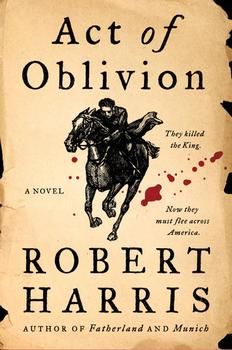Summary | Excerpt | Reviews | Beyond the Book | Readalikes | Genres & Themes | Author Bio

A Novel
by Robert Harris Part One
Hunt
1660
Chapter One
IF YOU HAD set out in the summer of 1660 to travel the four miles from Boston to Cambridge, Massachusetts, the first house you would have come to after crossing the Charles River would have been the Gookins'. It stood beside the road on the southern edge of the small settlement, just past the creek, midway across the marshy land between the river and Harvard College – a confident, two-storey timbered property in its own fenced lot with an attic in its steep roof commanding a clear view of the Charles. That year, the colony was building its first bridge across the river. Thick wooden piles were being driven into the mud close to the ramp where the ferryboat ran. The sound of hammering and sawing and the shouts of the workmen drifted up to the house on the drowsy midsummer air.
On this particular day – Friday 27 July – the front door was flung wide open, and a childish sign reading Welcome Home had been nailed to the gatepost. A passing student had reported that a ship from London, the Prudent Mary, had dropped anchor that morning between Boston and Charlestown. Among her passengers was believed to be Mr Daniel Gookin, the master of the property, returning to America after an absence of two years.
The house, spotless enough to begin with, had been quickly swept and tidied, the children scrubbed and forced into their best Sabbath clothes. By early afternoon, all five were waiting with Mrs Gookin in the parlour: Mary, who was twenty and named after her mother; Elizabeth, eighteen; and their three younger brothers, Daniel, ten, Samuel, eight, and four-year-old Nathaniel, who had no memory of his father and was fidgeting in his chair.
Mrs Gookin knew it was the prospect of the meeting, rather than being cooped up indoors, that was making him so fretful. She took him onto her lap, stroked his hair and spoke of the man who would soon walk through the door – of his goodness and kindness and his important work for the government in London, where he had been summoned by the Lord Protector himself. 'He loves you, Nat, and God will make it so that you love him.'
'What's a Lord Protect Her?'
'Protector, child. He was the ruler of England and America.'
'Like a king?'
'Yes, like a king, only better, because he was chosen by Parliament. But the Protector is dead now. That's why your father is coming home.'
Nat's eyes widened. 'If the Protector is dead, then who will protect us?'
It was a question that had defeated the cleverest minds in England, and Mrs Gookin found herself stuck for an answer. She spoke over Nathaniel's head to her daughter. 'Mary, go to the attic, will you, and see if your father is coming.'
Mary ran upstairs, and returned a minute later to report that the ferryboat was still moored on the opposite bank and there was no sign of anyone on the road.
From then on, the children took it in turns every quarter-hour to climb up to the attic and be the lookout, each time descending with the same answer. An awful conviction began to grow in Mrs Gookin's mind that her husband would not be coming after all – that his ship had not arrived, or that it had anchored but he was not on board. Perhaps he had never embarked from London, or some calamity had befallen him during the crossing. The shrouded body, the brief prayers, the corpse weighted at the neck sliding head-first down the gangplank into the waves – she could see it all. It had happened twice during their original voyage from England nearly twenty years before.
'Go outside, boys, and wait for him there.'
Nat scrambled off her lap and all three darted for the door like cats released from a sack.
'But don't dirty your clothes ...'
The girls remained in their places. Mary, who was most like her mother in her stolid good sense, and who had acted the man's role in the household over the past two years, said, 'I'm sure there's no need to worry yourself, Mama. God will have watched over him.'
Excerpted from Act of Oblivion by Robert Harris. Copyright © 2022 by Robert Harris. Excerpted by permission of Harper. All rights reserved. No part of this excerpt may be reproduced or reprinted without permission in writing from the publisher.
To be ignorant of what occurred before you were born is to remain always a child
Click Here to find out who said this, as well as discovering other famous literary quotes!
Your guide toexceptional books
BookBrowse seeks out and recommends the best in contemporary fiction and nonfiction—books that not only engage and entertain but also deepen our understanding of ourselves and the world around us.